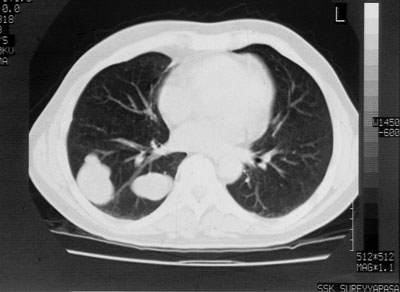What is Hydatid Cyst?
- E. granulosus is a parasite that causes cysts in various organs of the body.
- The most common locations for these cysts are the liver and lungs.
- It is frequently seen in rural areas where livestock farming is common.
- It is more common in individuals who have contact with street dogs.
This lung CT scan shows 2 hydatid cysts in the right lung.

Treatment of Lung Hydatid Cysts
There are two treatment methods: medication (albendazole) and surgical removal of the cysts.
Since medication alone cannot always completely cure the cyst, surgery is more commonly used.
Medications are typically used for individuals who have a widespread disease, or after *cyst surgery* to prevent recurrence.
Should Hydatid Cysts be Surgically Removed?
This parasitic disease proliferates by forming cysts. Hydatid cysts grow in the lungs and, if they spread to other organs (such as the liver, kidneys, and brain), the likelihood of successful treatment significantly decreases. They can cause respiratory difficulties, biliary obstruction in the liver, or pressure on the brain, leading to serious consequences. Therefore, the disease must be urgently treated. If medications do not provide improvement, cysts must be surgically removed.
What Do International Guidelines Recommend?
For detailed information on this topic, see the article titled “Resection of intrathoracic and subdiaphragmatic hydatid cysts” by clicking here.
What Are the Surgical Methods for Hydatid Cyst?
1. Open Surgery: In this method, the chest on the side of the disease is usually opened between the 5th and 6th ribs. The cysts are drained without damaging the lung tissue. Necessary precautions are taken to prevent the spread of the cysts into the chest cavity.
![hidatik.kist[1] Hydatid cyst appearance](https://www.akcigercerrahisi.com/wp-content/uploads/2015/01/hidatik.kist1_.jpg)
![hidatik.kist2[1]](https://www.akcigercerrahisi.com/wp-content/uploads/2015/01/hidatik.kist21.jpg)
For more information about endoscopic/closed surgery, click here.
What Are the Risks of Surgery?
The risk level is closely related to factors such as the presence of complications in other organs (such as the lungs, liver, kidneys, brain), the patient’s age and general condition, whether the cyst has ruptured, its size, etc. Post-surgery complications such as air leaks, infections, and prolonged drainage may occur. These risks should be anticipated, and necessary precautions should be taken to minimize them.
How Many Days Should I Stay in the Hospital After Surgery?
The average hospital stay after hydatid cyst surgery is 3-4 days.